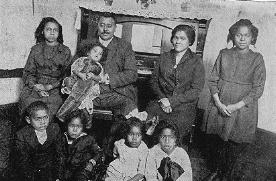

Young Hill attended the public schools of North Carolina and Virginia as a boy, most of his boyhood and youth being spent at Martinsville, Va., where he attended the Presbyterian Parochial School. Later, when the father secured a government job, and the family moved to Washington, D. C., he went to schools there. For his college work he went to Kittrell College, N. C., finishing there in 1903. The way to an education was not easy, but he refused to be discouraged and cheerfully accepted whatever work was available in order to pay his way in school. The happy, helpful influence of a Godly mother, together with the wholesome influence of a small Sunday School, in which he was a teacher and later superintendent, held him steady during the formative years of boyhood and youth. The lives of great men like Franklin, Washington and Lincoln were also helpful.
He began his work as a teacher at Martinsville, Va., in 1903, as assistant principal. He passed from that to the principalship, and while there did summer work in the Martinsville Christian Institute. During his Principalship ground was acquired for the relocation of new building for colored schools. School was moved from Brown St. to Genoa avenue, and a new building constructed.
In 1903 he resigned and accepted appointment from Governor H. D. Hatfield, as superintendent of West Virginia Colored Orphan's Home.
A system of receiving children was adopted and a system of placement. A field agent was appointed, who found homes and foster parents for the unfortunate children. This home was a state institution. During his administration the appropriation was increased from $10,000.00 per year to $12,000.00 for current expenses, $2,500.00 to $3,500.00 per year for repairs and improvements. A modern $7,000.00 barn and silo were constructed in which "The James" sanitary fixtures were placed. A brick engine house constructed, in which was placed a Foo's gas engine, a filteration system, worked out whereby the institution had a full supply of water at all times.
A $30,000.00 wing was built, in which was nursery, dormitory for girls, parlor, school room, drawing room, laundry and quarters for Superintendent and family. School room was equipped with desks of a modern make and adjustable, a farm of 190 acres was cleaned up, orchard of 500 Ben Davis and Roman Beauty apples pruned and a new orchard of apples, cherries and peach trees put out. Herds of proved, thorobred cows and hogs purchased for farm. During the war with an increased average population, maintenance was kept to normal and funds used in buying equipment.
He served three years of Governor Cornwell's administration, a democratic governor resigning to accept work as principal of Bluefield colored city schools.
Junior High School has been added and work in those grades put on a departmental basis, vocal music placed in the school with a paid supervisor.
He believes any child with an average environment reared in the average home, should be taught to do faithfully the simplest task assigned, or if a task is once begun, never leave it until it is done. Perseverance, determination, "Stick to-it- iveness," pluck, grit, industry, and preparation for life's work, meaning "academic" preparation, and willingness to render faithful and efficient service, will bring success, whether one has so much money or property or not. He can assure one that it will be satisfactory service, or a service out of which one gets the greatest amount of happiness, faithfulness, efficiency, perseverance and a desire to work for love rather than personal gain. To be in love with your job.
He was a lay delegate to the general conference of the A. M. E. church in 1908, which met at Norfolk, Va., and a member of Grand Lodge of Knights of Pythians.
In politics Prof. Hill is a Republican and has done considerable campaign work. Among the secret orders and benevolent societies he is identified with the Pythians, being treasurer of his local lodge and member of the Grand Lodge. He has been prominently mentioned for Grand Chancellor. He also belongs to the Masons.
On July 10, 1909, Prof. Hill married Miss Emma J. Waller, daughter of Henry and Eliza Waller, of Ridgeway, Va. They have a fine family of seven children. Their names are Beatrice, Partia, James L., Jr., Olivia, Virginia, Henry and Emma Hill. Prof. Hill's favorite books consist of the American and English classics.
He believes that the progress of the race is to be promoted by unity of action, by organization, by the establishment of Negro banks in centers and other lines of business. In schools and churches, preach support of Negro Enterprises.